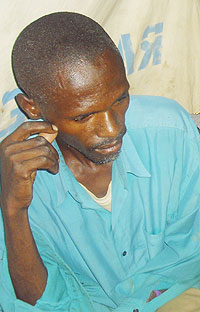Francois Habyarimana started doubting his HIV status when he started falling sick frequently. With his energy considerably reduced, the welfare of his family was threatened. He went to hospital and was diagnosed with HIV.


Francois Habyarimana started doubting his HIV status when he started falling sick frequently.
With his energy considerably reduced, the welfare of his family was threatened. He went to hospital and was diagnosed with HIV.
"After being found with HIV, TRAC (The Treatment and Research AIDS center,) provided me with antiretroviral drugs,” he says.
The sickness eased but the challenge was to quickly regain the energy required to get him back to work since he is the major bread winner for his family.
At 47, with unstable health, he is faced with fending for an infected wife whose health seems to be deteriorating and a seven year old son. He lives in the slum-hilly areas of Kimisagara, in the city suburbs.
Even with sickness and poor feeding he has to be on the lookout for odd jobs but says his job search isn’t as efficient as it used to be.
From appearance, Habyarimana looks emaciated and hungry. His tone voice is weak when talking.
"I married before I knew that I had the disease. My wife is also infected but my child is safe,” he says.
Outside, looking ill, the wife is layin on a mat basking in the morning sun. Her face is pale. Their son, Jean Damascene Kizuzo, a smile on his face, plays with neighboring kids ignorant of the family dilemmas.
"She used to hawk vegetables but the police arrested her… Her legs are now swollen and she doesn’t work anymore.
"She is sick and I have to solely fend for the family,” he says.
From the pocket of his pair of trousers, Habyarimana digs out Rwf350 and tells me that it is the only money he is left with, and is unsure of feeding the family in the following days.
"A friend called me to paint his house and paid me Rwf1500. That is the money we have been depending on since Sunday.”
At 33, ambitious Habyarimana made his way to the urban area from upcountry to try and earn a living as an unskilled labourer.
After his parents died he had remained home as his elder brother made off to the urban area.
Before he died during the 1994 genocide against the Tutsi, his brother was married with a child and had built two rental shack houses in Kimisagara.
On arrival in town he was taken in by his brother but left after he married. On his own, Habyarimana found his way around and after several years he banked on experience as a skilled builder.
He had gained popularity as a builder and life was good until he was diagnosied with HIV.
He hadn’t built his own house.
Now, he is living in one of the shacks left behind by his brother and he is scared that he might be evicted anytime by his nephew.
"My decesead brother’s son is now old. My biggest worry is that he will come anytime and tell us to leave. Where will wego?” he asks with shock written on his face.
And his other fear is that on eviction, hardships will worsen which might force his wife to leave him.
But the house is also in poor shape. Looking at the roof from the inside, sun light finds its way in through numerous holes in the iron sheets.
"When it rains, we stand and surround ourselves with basins,” he says.
He adds that, "we don’t sleep until it stops raining.”
Pointing at the wall adjacent to the latrine that has fresh mud, "I have repaired the wall several times but it keeps getting damaged by rain water that leaks through the roof of the latrine.”
The entrance to the unkempt latrine is close enough for fleas to find their way into the main house.
The incurable disease doesn’t seem to be Habyarimana’s worst worry but the lack of a sustainable livelihood for his family. To him each day that passes and the family remain together is a miracle.
Ends


